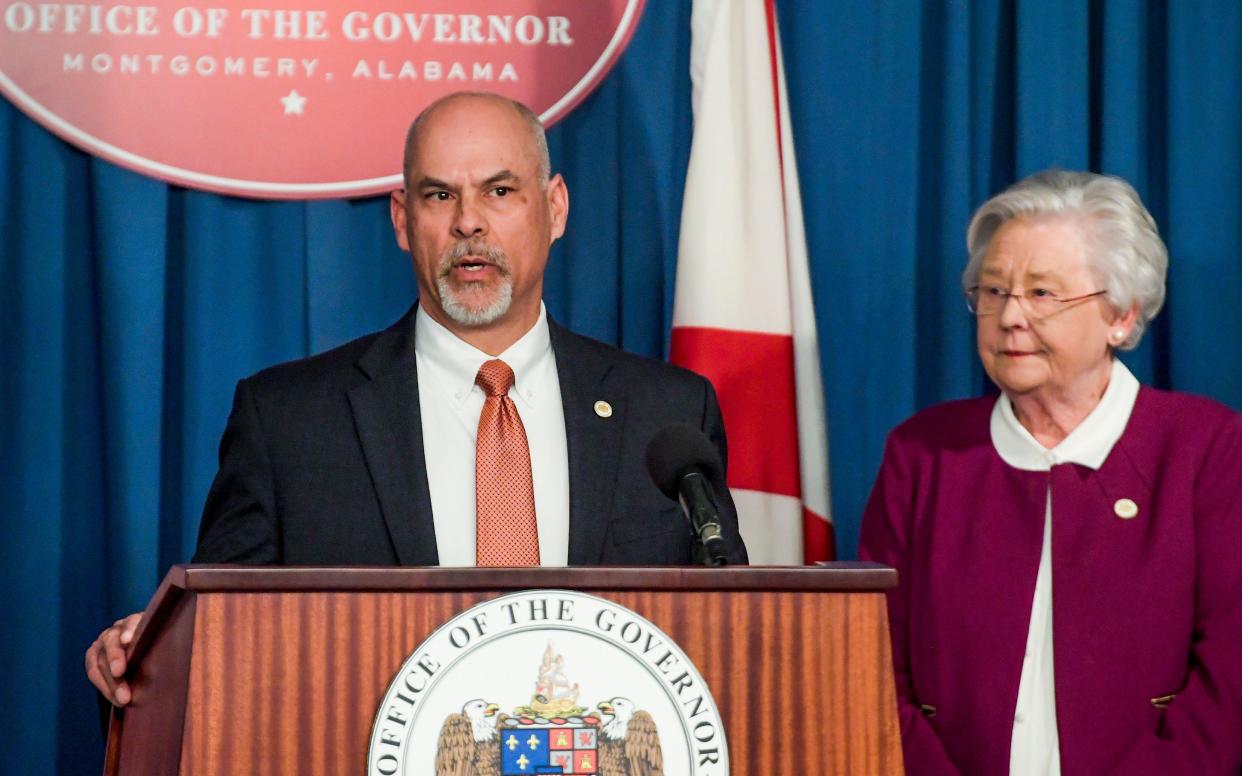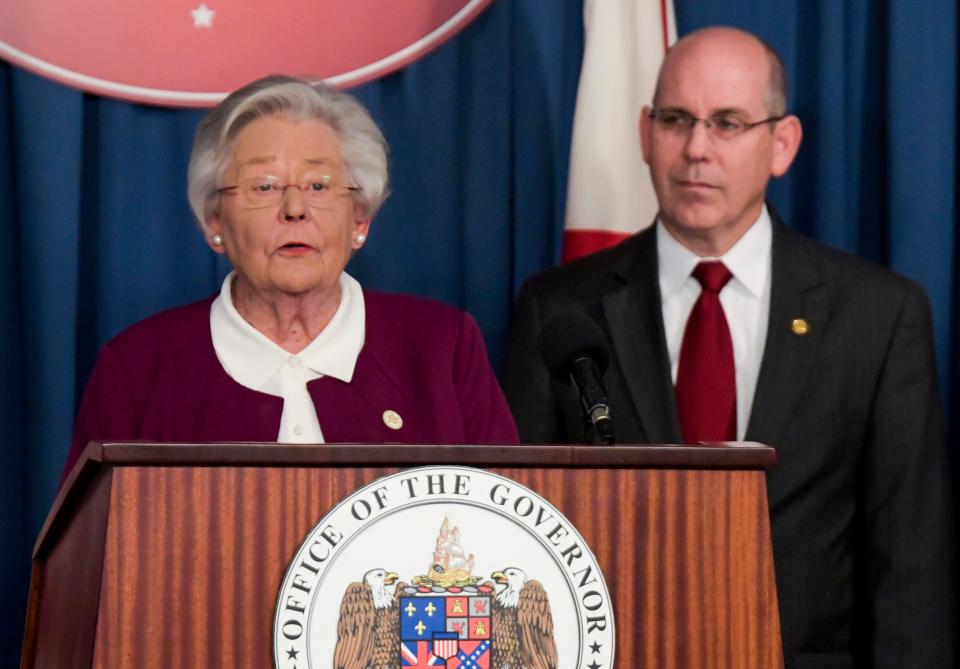Ivey details order for how 'good time' among prisoners can be revoked

- Oops!Something went wrong.Please try again later.
Gov. Kay Ivey on Monday signed an executive order limiting the ability of Alabama prisoners accused of violations to earn time off their prison sentences.
The order includes specific procedures on how correctional incentive time, also called “good time,” is revoked and how it can be earned back, which was not well defined in state law. Ivey and law enforcement officials hailed the changes as a way to encourage good behavior while ensuring public safety.
Advocates for the incarcerated, however, say the laws will inject more hopelessness into the state’s failing prison system.
The new statute classifies violations into four categories with increasing amounts of good time lost based on severity. Those who commit the most severe violations, including homicide, escape and forcible sexual assault, will lose all accrued good time and will be ineligible to earn it back.
“Our actions today, very simply put, keeps violent offenders off the street, incentivizes inmates who truly want to rehabilitate and better themselves, and reinforces the concept that bad choices have consequences,” Ivey said at a news conference at the Alabama State Capitol Monday morning.
Some public officials have criticized the state’s good time laws after two former inmates released on good time were charged with the killings of law enforcement officials in recent years. Attorney General Steve Marshall took aim at the laws following the death of Bibb County Sherriff’s Deputy Brad Johnson in June, calling them “ultra-lenient” and “broken.”
Austin Patrick Hall, charged with murder in Johnson’s death, had been released on good time when Johnson was killed, but it appears government errors are to blame for his release. Statutes in place at the time indicate he should have been ineligible for good time: Hall had escaped from prison, but he was never charged with escape.
Alabama Department of Corrections Commissioner John Hamm thanked Ivey for the order and said he hopes the law will encourage good behavior from the incarcerated population.
Hamm said he doesn’t believe that the changes to good time will have much of an impact on the state’s prison population, which is already far above the system’s carrying capacity. Hamm estimated that only 20-25% of all incarcerated people are eligible for good time. Ineligible for earning good time is anyone convicted of Class A felony; convicted of a sex offense involving a minor; convicted of murder, manslaughter or another crime that resulted in another person’s death; or sentenced to more than 15 years or death.
Alabama Appleseed, a prisoners’ advocacy group, said harsher punishments aren’t the answer to the crisis in Alabama prisons, which saw a record number of deaths in custody last year.
“This is absurd and reflects state leadership that is completely out of touch with the public safety crisis in Alabama prisons. This order essentially ends good time or makes it extremely difficult for anyone to earn it given the brutal conditions across the prison system,” wrote Alabama Appleseed Executive Director Carla Crowder in a statement.
“Gov. Ivey’s executive order will likely disincentivize good behavior by contributing to the overcrowding and hopelessness that’s pervasive in prisons that have disintegrated into violence and chaos four years after being declared unconstitutional by the United States Department of Justice.”
Hamm said ADOC is in the process of informing prisoners of the new changes.

The four levels of violations carry different amounts of good time lost, how long until that lost time can be restored and when violators can begin earning more good time.
“Severe” violations
Include homicide, escape, assault with a weapon and forcible sexual assault
Good time lost: All
When lost good time can be restored: Those who commit severe violations can’t have revoked good time restored
How long to start earning more good time: Those who commit severe violations permanently lose the ability to earn good time except in rare circumstances determined by the ADOC commissioner
“High” severity violations
Include but are not limited to assault without a weapon, fighting with a weapon, non-assault sexual offenses, robbery, rioting, encouraging or causing a work stoppage, failure to obey a direct order of an ADOC employee and drug possession
Good time lost: Three years minimum
How long to apply for restoration of lost good time: One year without violation, in 90-day increments
How long to start earning more good time: One year without violation
“Medium” severity violations
Include but are not limited to fighting without a weapon, destruction of property, possession of gang paraphernalia, refusing to work and two “low” severity violations within a year
Good time lost: Two years minimum
How long to apply for restoration of lost good time: Six months without violation, in 90-day increments
How long to start earning more good time: Six months without violation
“Low” severity violations
Include but are not limited to disorderly conduct, contraband possession, being in an unauthorized area, and gambling
Good time lost: One day minimum
How long to apply for restoration of lost good time: 90 days without violation
How long to start earning more good time: Those who commit low severity violations don’t automatically lose their earning status
Evan Mealins is the justice reporter for the Montgomery Advertiser. Contact him at emealins@gannett.com or follow him on Twitter @EvanMealins.
Your subscription makes our journalism possible. Subscribe today.
This article originally appeared on Montgomery Advertiser: Ivey details order for how 'good time' among prisoners can be revoked

